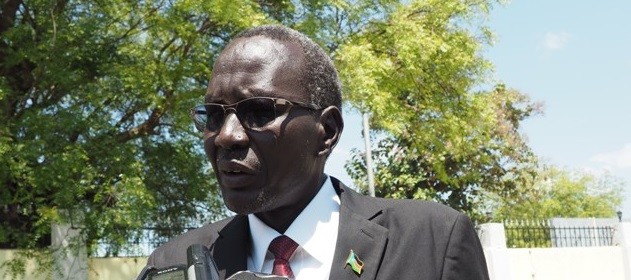This report is part of an exclusive series, ‘War Economy’, which focuses on the economic situation in South Sudan.
The South Sudanese government’s budget for the current fiscal year is more than twice what it earned in oil revenues last year, according to figures provided by Petroleum Minister Stephen Dhieu Dau.
The Appropriations Act sets a budget of 11.28 billion SSP for the current fiscal year. This is equivalent to 3.76 billion US dollars converted at the official central bank exchange rate. This compares to net oil revenues last year of 1.7 billion USD, equivalent to 5.1 billion SSP.
Minister of Petroleum Stephen Dhieu Dau explained in an end-of-year message on 30 December 2014 that gross oil revenues were 3.376 billion US dollars, but USD 884 million had to be paid to Sudan for pipeline fees and other obligations and USD 781 million had to be repaid to oil companies for loans given during the January 2012 to April 2013 oil shutdown.
Dhieu disclosed that the South Sudanese government had borrowed an “aggregate amount of US $1.2 billion dollars in pre-payments for advance sales of South Sudan crude oil during the oil shut down period and after the resumption of oil production.”
Over 80% of these debts were repaid last year by way of crude oil deliveries, according to Dhieu. But this means that approximately 20% of them, or more than $200 million, still need to be paid. In the meantime, the government has incurred new debts due to wartime borrowing last year and this.
Even if the burden of debt repayments decreases this year, the revenues from oil production at current levels fall far short of covering the government’s budgeted expenses, owing to a steep drop in oil prices on international markets since last year.
It should be noted that the fiscal year budget cited above covers the fiscal year period July 2014 to June 2015 whereas the revenue figures cited by the Petroleum Minister cover the calendar year period January 2014 to December 2014. Additionally, non-oil revenues are not here considered.
These figures therefore cannot be used to indicate with any accuracy the current deficit levels. The true size of the government’s current budget deficit is not publicly known. Finance Minister-designate David Deng Athorbei has stated that he is seeking at least $500 million in loans to cover the gap.
File photo: Petroleum Minister Stephen Dhieu Dau
Read more from the seres ‘War Economy’:
Irrecoverable losses at S Sudan oil fields (30 March)
Kiir’s office spends more than budget of an entire state (28 March)
Secrecy around South Sudan’s dwindling central bank reserves (28 March)
South Sudan’s Lakes police paid 2 months late (27 March)
Bread price rises in South Sudan state capital (27 March)
South Sudan fiscal report delayed after Q1 overspend (27 March)
South Sudan denies printing more money (27 March)




